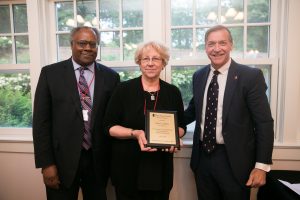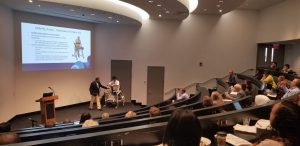On June 3-5, 2018, NCSCE partnered with Stony Brook University and the State University of New York system to host the SUNY-Industry Conference and Showcase: Science and Engineering for Social Good. The meeting brought together more than 80 representatives of academia, industry and NGOs to share and explore the ways in which these sectors can build and leverage mutually beneficial relationships and programs for the good of learners and society at large.
The program began with opening remarks from Stony Brook University President Samuel Stanley, NCSCE Executive Director Eliza Reilly, Stony Brook University Distinguished Service Professor and Provost’s Scholar Dave Ferguson and Stony Brook University AERTC Chairman Robert Catell. The opening plenary was delivered by Peter Small, Founding Director of Stony Brook’s Global Health Institute, who discussed the ways in which various technologies, such as drones and Android apps, can directly improve health outcomes in impoverished areas of the world. Following the plenary address was the first round of talks from participants about projects at their institutions on the topic of science and engineering for social good. The evening ended with a reception, at which Stony Brook University presented awards for advancing civic engagement and socially beneficial science and engineering. The awardees were:

- Edward Coyle, Director of the Arbutus Center for the Integration of Research and Education at the Georgia Institute of Technology
- Heather Hage, Vice President for Industry and External Affairs at The Research Foundation for the State University of New York
- Jay Labov, Senior Advisor for Education and Communication at the National Academies of Sciences, Engineering, and Medicine
- Eliza Reilly, Executive Director of the National Center for Science and Civic Engagement
Monday’s program started with a panel on funding opportunities at the National Science Foundation and National Institutes of Health. Personnel from both agencies discussed the priorities of each, and how these priorities translate into opportunities for academic-industry partnerships. The panel, moderated by Eliza Reilly, included:
- Myles Boylan, Program Director, Division of Undergraduate Education (DUE) at the National Science Foundation
- Martha James Program Officer, Directorate for Education and Human Resources, Division of Human Resource Development at the National Science Foundation
- Andre Marshall Program Director, Industry University Cooperative Research Centers Program (IUCRC) at the National Science Foundation, and
- Ethel Rubin Entrepreneur-in-Residence, Office of Extramural Research at the National Institutes of Health
Following the second block of talks and a poster session showcasing participant work, the afternoon plenary was delivered by Edward Coyle, Director of the Arbutus Center for the Integration of Research and Education at the Georgia Institute of Technology. He presented the Vertically Integrated Projects (VIP) Program, which engages students at all levels, faculty, and occasionally industry in multidisciplinary, large-scale, and long-term research projects. Monday’s reception included an organizational showcase, which allowed representatives from the VIP Consortium, Stony Brook University’s industry partnership programs and Stony Brook University’s Center for Inclusive Education, to share their work.

Tuesday opened with a plenary by Heather Hage, Vice President for Industry and External Affairs at The Research Foundation for the State University of New York, who talked about the ways in which the SUNY Research Foundation investments and partnerships change lives. The presentation included a demonstration of a mobile ambulatory aid device developed by a SUNY faculty member. After the final block of talks, Jay Labov, Senior Advisor for Education and Communication at the National Academies of Sciences, Engineering, and Medicine presented the final plenary address, which offered a systems analysis of the challenges and opportunities facing the STEM education ecosystem, including formal and informal sectors, k-12, undergraduate, and graduate education.
You can view the full meeting program book here, and selected presentations submitted by the authors here.
NCSCE would like to acknowledge the following organizations for support of the Conference:
Stony Brook University
Office of the President
Office of the Provost
Office of the Vice President for Research (OVPR)
Office of the Vice President for Economic Development
Advancement
College of Engineering and Applied Sciences (CEAS)
College of Arts and Sciences (CAS)
Health Sciences
Department of Technology and Society in CEAS
Career Center
The State University of New York
SUNY System
Office of the Vice Chancellor for Research and Economic Development
Office of Undergraduate and STEM Education
Office of Applied Learning
Office of Diversity, Equity & Inclusion
SUNY Research Foundation
Office of the Vice President for Industry and External Affairs
Others
Louis Stokes Alliance for Minority Participation Programs (LSAMP)
SUNY LSAMP
Soter Technologies
